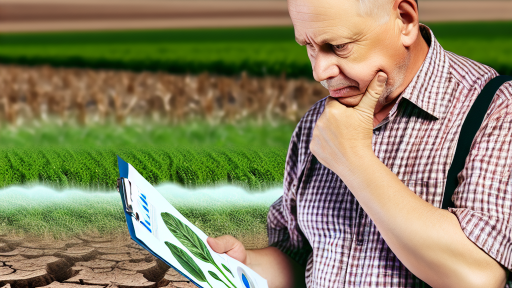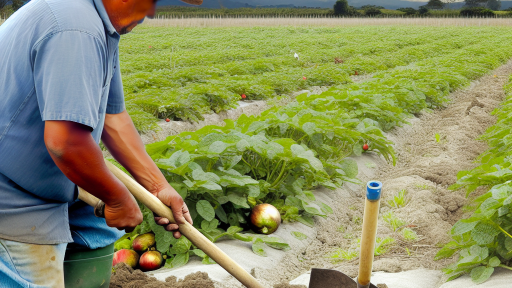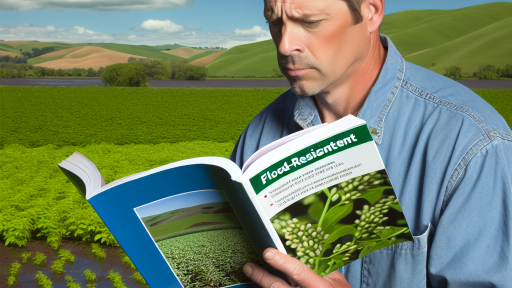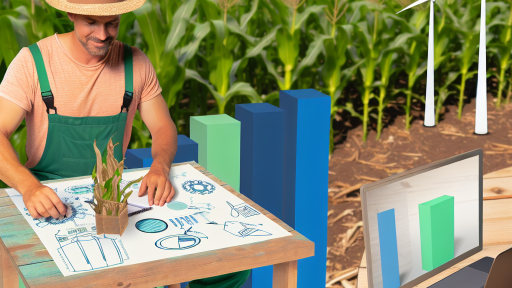Introduction to Precision Agriculture and its Importance in Water Management
Precision agriculture revolutionizes farming practices around the globe.
This innovative approach utilizes advanced technology for improved crop production.
Water management plays a crucial role in successful agricultural practices.
Effective water management ensures optimal crop health and yield.
Moreover, it conserves water resources, making agriculture more sustainable.
Farmers face increasing pressure to improve efficiency and productivity.
Adopting precision agriculture tools directly addresses these challenges.
These tools facilitate precise irrigation scheduling and application.
Consequently, they reduce water waste and enhance soil moisture retention.
Additionally, precision agriculture allows for real-time monitoring of field conditions.
Farmers can assess soil needs and crop stages more accurately.
Predictive analytics further aids in optimizing irrigation strategies.
This proactive approach minimizes risks associated with drought or overwatering.
Precision agriculture transforms water management into a strategic advantage.
Embracing these technologies will help secure a sustainable future for farming.
Transform Your Agribusiness
Unlock your farm's potential with expert advice tailored to your needs. Get actionable steps that drive real results.
Get StartedOverview of Precision Agriculture Tools for Water Management
Introduction to Precision Agriculture
Precision agriculture uses technology to enhance farming practices.
This method focuses on optimizing field-level management regarding crop farming.
As a result, farmers can improve productivity and reduce waste.
Importance of Water Management
Water management is crucial in agriculture due to rising environmental concerns.
Efficient water usage helps maintain soil health and boosts crop yields.
Furthermore, it reduces costs and maximizes sustainability in farming.
Types of Precision Agriculture Tools
Several tools are available for effective water management in precision agriculture.
These tools leverage technology to provide real-time data and analysis.
- Soil moisture sensors measure water levels in the soil.
- Aerial drones gather data on crop health and water needs.
- Irrigation management systems optimize water distribution.
Soil Moisture Sensors
Soil moisture sensors provide valuable information about water availability.
They help farmers make informed decisions about irrigation scheduling.
By analyzing the data, farmers can avoid overwatering and conserve resources.
Aerial Drones
Aerial drones offer insights into crop health through remote sensing.
These devices capture images that reveal water stress in plants.
Ultimately, drones enable timely interventions to prevent crop loss.
Irrigation Management Systems
Advanced irrigation systems automate water delivery based on real-time conditions.
This technology increases efficiency and ensures crops receive appropriate water levels.
Integrating these systems leads to significant cost savings and enhanced crop outcomes.
Benefits of Using Precision Agriculture Tools
Utilizing precision agriculture tools leads to smarter resource management.
Farmers experience increased crop yields and reduced input costs.
Moreover, these tools promote environmental sustainability and resilience.
Soil Moisture Sensors: Types, Benefits, and Installation Practices
Types of Soil Moisture Sensors
Sensors designed to measure soil moisture come in various types. They are intended to meet different agricultural needs.
Capacitive sensors measure the dielectric constant of soil. They help in determining the moisture content present.
Resistive sensors gauge moisture levels by using electrical resistance. They provide another option for farmers.
Tensiometers measure tension or suction of water in soil. This indicates moisture availability for plant roots.
Showcase Your Farming Business
Publish your professional farming services profile on our blog for a one-time fee of $200 and reach a dedicated audience of farmers and agribusiness owners.
Publish Your ProfileEach type of sensor serves a unique purpose. It depends on the crop and soil characteristics.
Benefits of Soil Moisture Sensors
Sensors provide numerous benefits to farmers. They optimize irrigation scheduling effectively.
By using these sensors, farmers can reduce water wastage. It leads to more sustainable practices.
Improving crop yields is another advantage. The right amount of water enhances growth potential.
Farmers can also monitor soil health regularly. This prevents over-irrigation issues from occurring.
Ultimately, these devices facilitate informed decisions. They guide farmers regarding water usage efficiently.
Installation Practices for Soil Moisture Sensors
Proper installation is essential for optimal sensor performance. It directly impacts measurement accuracy.
First, choose appropriate locations. These should represent the crop’s root zone effectively.
Next, ensure sensors are installed at appropriate depths. This ensures accurate readings of moisture levels.
Calibration of the sensors is crucial. It guarantees accurate moisture level readings over time.
Regular maintenance is required for these devices. Check sensor readings to monitor trends effectively.
Integrating Soil Moisture Sensors with Irrigation Systems
Integrating sensors with irrigation systems enhances efficiency. This leads to improved water management practices.
Smart irrigation systems can automatically adjust water delivery. This is based on real-time sensor data.
This integration minimizes manual intervention. It reduces labor costs for farmers significantly.
Additionally, it promotes optimal water use. Crop growth stages require different watering needs.
By adopting this technology, farmers can achieve sustainable agriculture goals. This ensures long-term viability.
See Related Content: Sustainable Farming Techniques for Unpredictable Weather
Irrigation Management Systems: Utilizing Data for Efficient Water Use
Introduction to Irrigation Management
Efficient irrigation management is essential for sustainable agriculture.
Farmers face challenges related to water usage and distribution.
Data-driven approaches improve overall irrigation practices.
Utilizing precision agriculture tools supports informed decision-making.
Importance of Data in Irrigation
Data collection enhances understanding of water needs.
Farmers can analyze historical weather patterns effectively.
Soil moisture sensors provide valuable information about field conditions.
This data informs irrigation schedules and reduces waste.
Types of Irrigation Management Systems
Various systems cater to specific farming needs.
Drip irrigation delivers water directly to the roots.
This method minimizes evaporation and runoff.
Furthermore, sprinkler systems offer a versatile option for large fields.
Integrating Technology into Irrigation Management
Modern technologies drive advancements in irrigation efficiency.
GPS systems help in mapping and planning irrigation layouts.
Drones provide aerial assessments of crop health and water needs.
Smart irrigation controllers adjust watering schedules automatically.
Benefits of Improved Water Management
Effective irrigation management leads to significant cost savings.
Farmers experience higher crop yields and better resource usage.
Moreover, improved practices contribute to environmental sustainability.
These benefits enhance the overall health of agricultural ecosystems.
Learn More: Farmers’ Toolkit for Climate Adaptation Success
Remote Sensing Technologies: Monitoring Crop Water Needs from Above
Introduction to Remote Sensing
Remote sensing plays a crucial role in modern agriculture.
This technology helps farmers assess crop health and water needs efficiently.
Showcase Your Farming Business
Publish your professional farming services profile on our blog for a one-time fee of $200 and reach a dedicated audience of farmers and agribusiness owners.
Publish Your ProfileBeyond traditional methods, it offers real-time insights into field conditions.
Types of Remote Sensing Technologies
Various technologies fall within the remote sensing category.
Satellite imagery provides extensive data coverage for large areas.
Drones offer detailed views of specific fields and crops.
Aerial photography captures images that reveal crop stress and water deficits.
Benefits of Remote Sensing for Water Management
Implementing remote sensing improves irrigation practices significantly.
Farmers can identify under-watered areas quickly and accurately.
This technology helps conserve water resources by optimizing usage.
Additionally, it enhances crop yield by ensuring plants receive adequate moisture.
Data Interpretation and Actionable Insights
Data collected through remote sensing undergoes thorough analysis.
Farmers can pinpoint which sections require immediate irrigation adjustments.
Collaborating with agronomists can improve interpretation of the collected data.
Analytics software facilitates timely decision-making based on real-time information.
Case Studies Demonstrating Effectiveness
Several case studies illustrate the successful application of remote sensing.
One farm utilized drone technology to monitor water usage effectively.
Results showed a 15% reduction in water consumption with improved crop performance.
Another study highlighted the benefits of using satellites for large-scale monitoring.
Challenges and Considerations
Despite its advantages, remote sensing has certain challenges.
High initial costs for technology can deter some farmers.
Access to skilled personnel for data analysis poses another obstacle.
However, many companies offer training to bridge this knowledge gap.
You Might Also Like: Economic Strategies for Climate-Resilient Agricultural Practices
Drones in Agriculture: Applications for Water Management and Crop Health Analysis
The Role of Drones in Water Management
Drones provide farmers with valuable data for efficient water management.
Their high-resolution imagery reveals water stress areas in crops.
Farmers can quickly adjust irrigation systems based on this data.
This proactive approach improves water usage efficiency significantly.
Crop Health Monitoring
Using drones, growers can monitor crop health remotely.
Drones equipped with multispectral cameras capture essential images.
These images highlight variations in crop health effectively.
Farmers can identify issues such as pests or diseases early.
Timely intervention helps reduce crop loss and increases yields.
Creating Precision Irrigation Plans
Drones assist in creating precise irrigation plans.
They map fields and analyze moisture levels accurately.
This data allows farmers to implement targeted irrigation.
Consequently, they can reduce water waste and improve yield quality.
Real-World Examples of Drone Usage
Several farms are already using drones for these purposes.
Green Valley Farms utilizes drones for crop health assessment.
They report improved crop health and reduced irrigation costs.
Sunny Acres employs drones for detailed moisture mapping.
As a result, they have seen a significant reduction in water usage.
Showcase Your Farming Business
Publish your professional farming services profile on our blog for a one-time fee of $200 and reach a dedicated audience of farmers and agribusiness owners.
Publish Your ProfileThe Future of Drone Technology in Agriculture
Drones will play a critical role in future agricultural practices.
Advancements will enhance their capabilities for water management.
Integration with artificial intelligence may revolutionize efficiency.
Farmers will gain even more precise insights into their fields.
This evolution promises to improve sustainability across the industry.
Explore Further: Adaptation Strategies for Farmers in Changing Climates
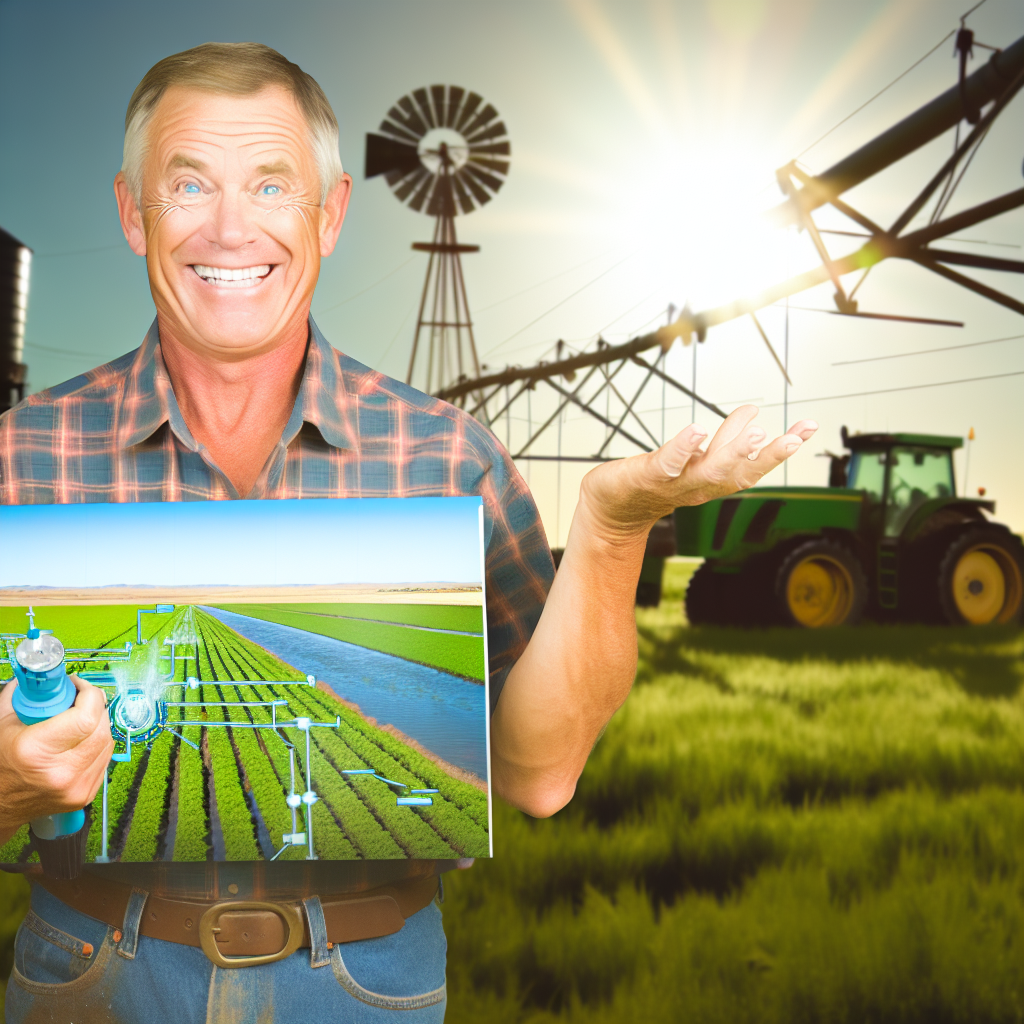
Data Analytics and Software Solutions: Making Sense of Water Usage Data
The Importance of Data in Water Management
Data analytics plays a crucial role in modern water management.
It allows farmers to analyze their water usage effectively.
By gathering data, they can identify patterns and trends.
Consequently, this knowledge leads to informed decision-making.
Moreover, it enhances the efficiency of water resources.
Software Tools for Data Analytics
Various software solutions are available for farmers today.
These tools help visualize and interpret water usage data.
For instance, Water Management Pro provides real-time analytics.
FarmLogix offers powerful tools for tracking irrigation patterns.
Both enhance decision-making for sustainable farming practices.
Integrating IoT with Data Analytics
Integrating IoT devices with data analytics is increasingly common.
Smart sensors measure soil moisture levels accurately.
This data can be analyzed to optimize irrigation schedules.
As a result, farmers can conserve water resources.
Additionally, they can improve crop yields effectively.
Case Studies in Data-Driven Water Management
Several case studies illustrate successful water management strategies.
Green Acres Farm reduced water usage by 30% using analytics.
They modified irrigation based on detailed water usage reports.
Sunny Fields Ranch increased crop yield through better practices.
They implemented software tools to track and adjust irrigation.
The Future of Data Analytics in Agriculture
The future holds great potential for data analytics in agriculture.
Advancements in AI will further enhance decision-making processes.
Farmers will gain deeper insights into resource management.
As a result, they will make smarter, more sustainable choices.
Ultimately, this could lead to improved food security worldwide.
Case Studies: Successful Implementation of Precision Tools for Water Management
Farmers Leveraging Drone Technology
In 2022, Anna Rodriguez, a farmer in California, adopted drone technology for irrigation management.
The drones provided aerial imagery of her fields during a critical growth phase.
This approach enabled Anna to identify areas of overwatering and drought stress efficiently.
As a result, she optimized her water usage, reducing costs by 15% while improving crop yield.
Smart Sensors in Action
In Texas, Carter Farms implemented smart soil sensors to improve irrigation practices.
These sensors monitored soil moisture levels in real-time throughout the growing season.
Consequently, the farm reduced water waste and saved 20% on water expenses.
Smart technology enabled Carter Farms to achieve healthier crops and maintain sustainability.
Precise Irrigation Scheduling
Green Valley Orchards established a precision irrigation system in 2021.
Showcase Your Farming Business
Publish your professional farming services profile on our blog for a one-time fee of $200 and reach a dedicated audience of farmers and agribusiness owners.
Publish Your ProfileThis system integrated weather forecasts and soil data to schedule watering times accurately.
As a result, the orchard saw a reduction in water usage by 30% year-over-year.
Furthermore, the trees exhibited improved health and fruit quality.
Collaboration with Tech Companies
A collaborative effort with AgriTech Solutions resulted in innovative tools for Meadow Farms.
The farm utilized software that provided data analytics on water application methods.
Through this software, Meadow Farms improved decision-making regarding irrigation schedules.
Consequently, the farm increased efficiency and boosted overall production.
Education and Training Initiatives
Elmwood Community hosted workshops on precision agriculture for local farmers.
Participants learned about the integration of technology for water management.
The training helped farmers adapt to new tools and improve their water conservation techniques.
These initiatives fostered community engagement and shared knowledge.
Challenges and Future Trends in Precision Agriculture for Water Management
Identifying Current Challenges
Water scarcity poses a significant challenge in agriculture today.
Farmers often struggle to obtain sufficient water for their crops.
Additionally, improper water management leads to waste and inefficiency.
Climate change introduces unpredictability in rainfall patterns.
This unpredictability complicates irrigation planning for farmers.
Furthermore, soil erosion and salinity affect water retention in fields.
These issues create a need for better water management strategies.
Emerging Trends in Precision Agriculture
Technological advancements drive change in water management practices.
Sensor technology provides real-time data on moisture levels.
Farmers can use this data to make informed irrigation decisions.
Drones offer aerial insights into crop health and water needs.
Moreover, satellite imagery enhances large-scale monitoring.
This technology allows for precision applications of water.
Adopting Sustainable Practices
Sustainable water management practices gain popularity among farmers.
Rainwater harvesting captures and utilizes natural precipitation.
Drip irrigation systems minimize water waste in crops.
Crop rotation helps maintain soil health and moisture retention.
Using cover crops also promotes water conservation in fields.
Future Innovations
Artificial intelligence will play a key role in future developments.
AI can analyze data and suggest optimal watering schedules.
Blockchain technology ensures transparency in water usage.
Furthermore, new irrigation technologies could arise from ongoing research.
These could include automated systems tailored to crop needs.
Collaboration and Education
Collaboration between farmers and tech firms is crucial.
Joint efforts can lead to innovative solutions for water management.
Education and training for farmers on new technologies is essential.
This ensures effective adoption of precision agriculture practices.
Ultimately, informed farmers will contribute to sustainable agriculture.
Additional Resources
Precision Agriculture: Benefits and Challenges for Technology …
Showcase Your Farming Business
Publish your professional farming services profile on our blog for a one-time fee of $200 and reach a dedicated audience of farmers and agribusiness owners.
Publish Your Profile
